Resume
Clinical Lab Technician Cover Letter Examples

May 29, 2025
|
12 min read
Unlock your potential with these expert tips for writing a Clinical Lab Technician cover letter. Learn how to highlight your skills, sample work, and experience to make your application a positive "reaction" in the hiring process.
4.70 Average rating
Rated by 348 people
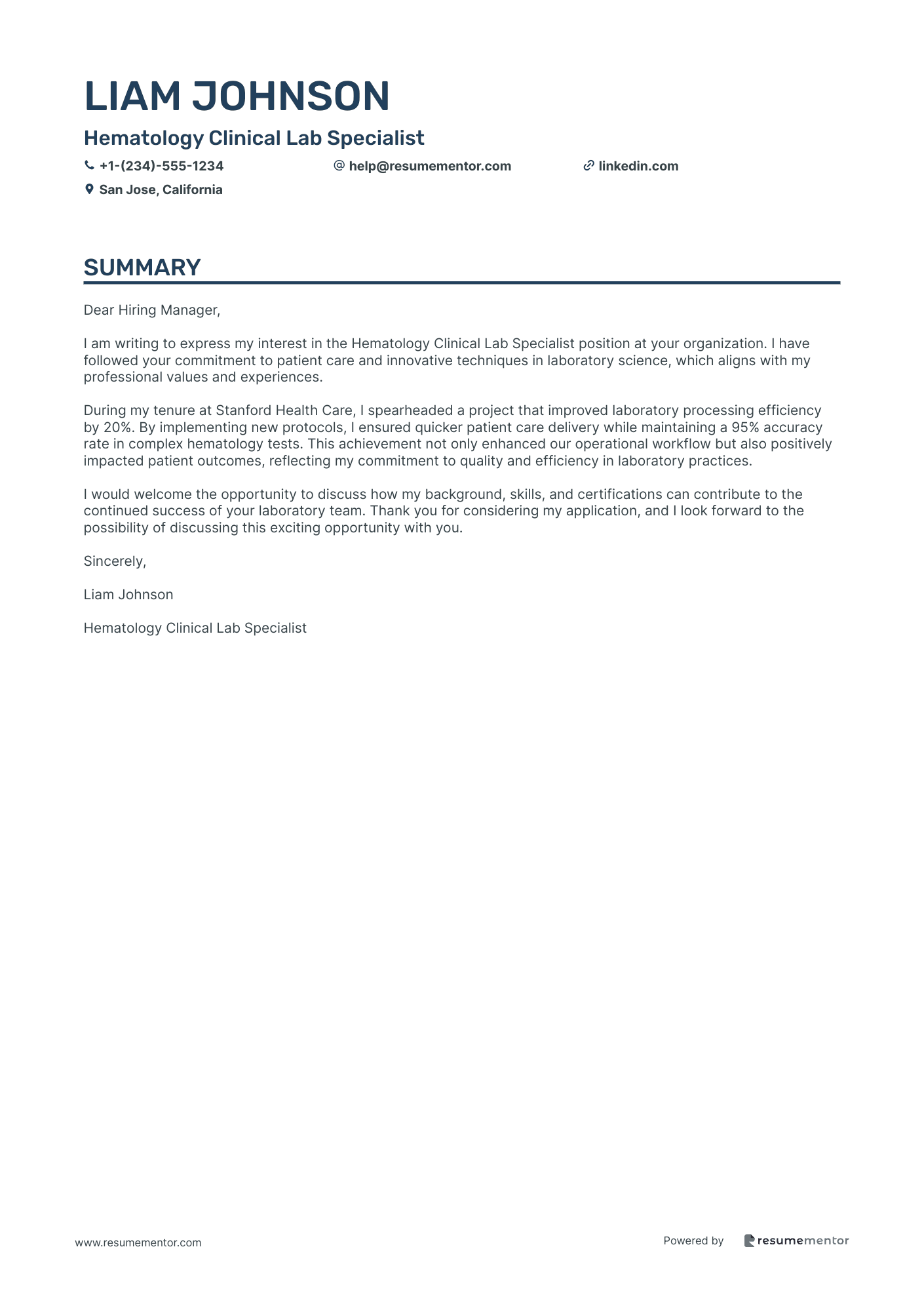
Hematology Clinical Lab Specialist
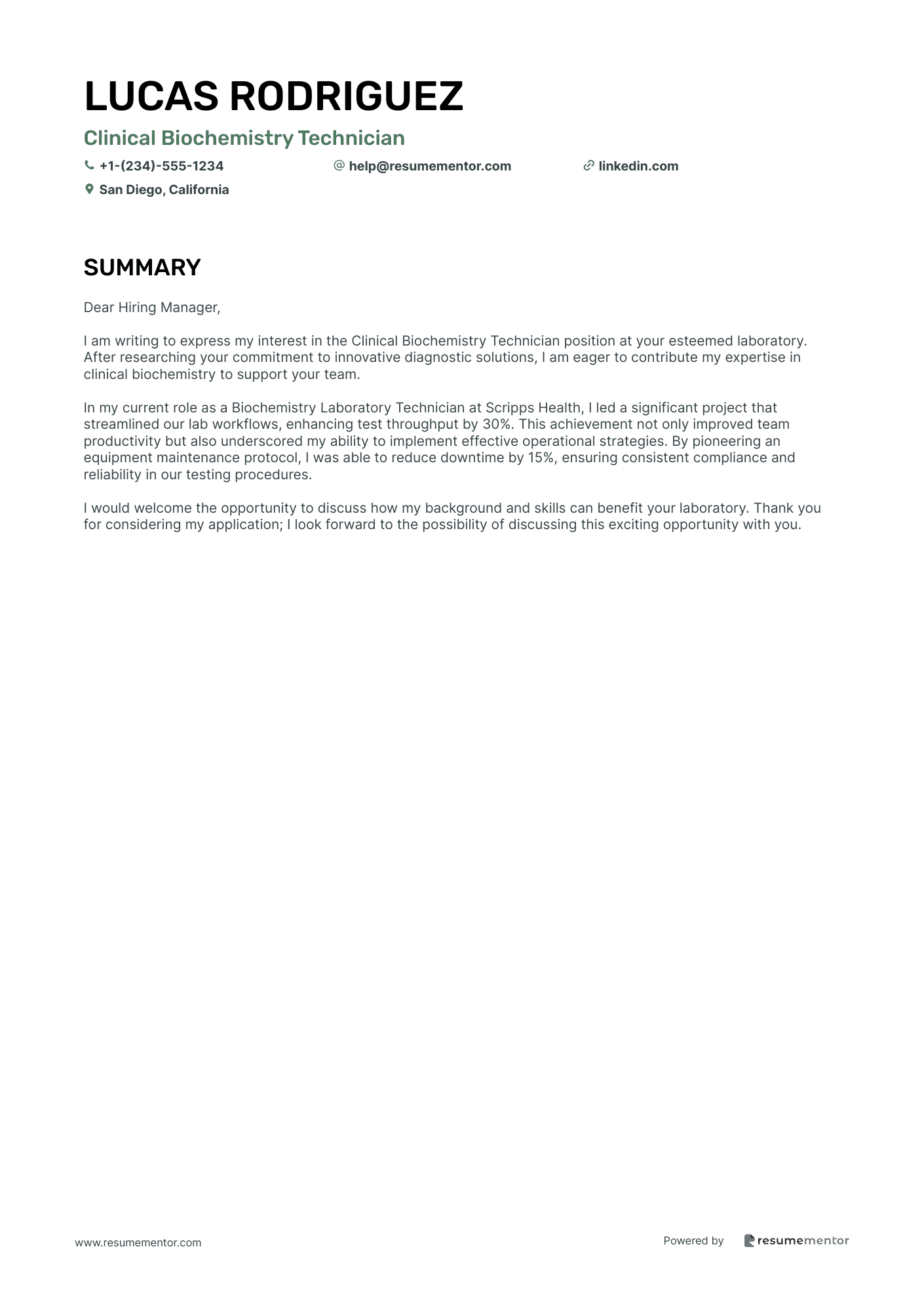
Clinical Biochemistry Technician
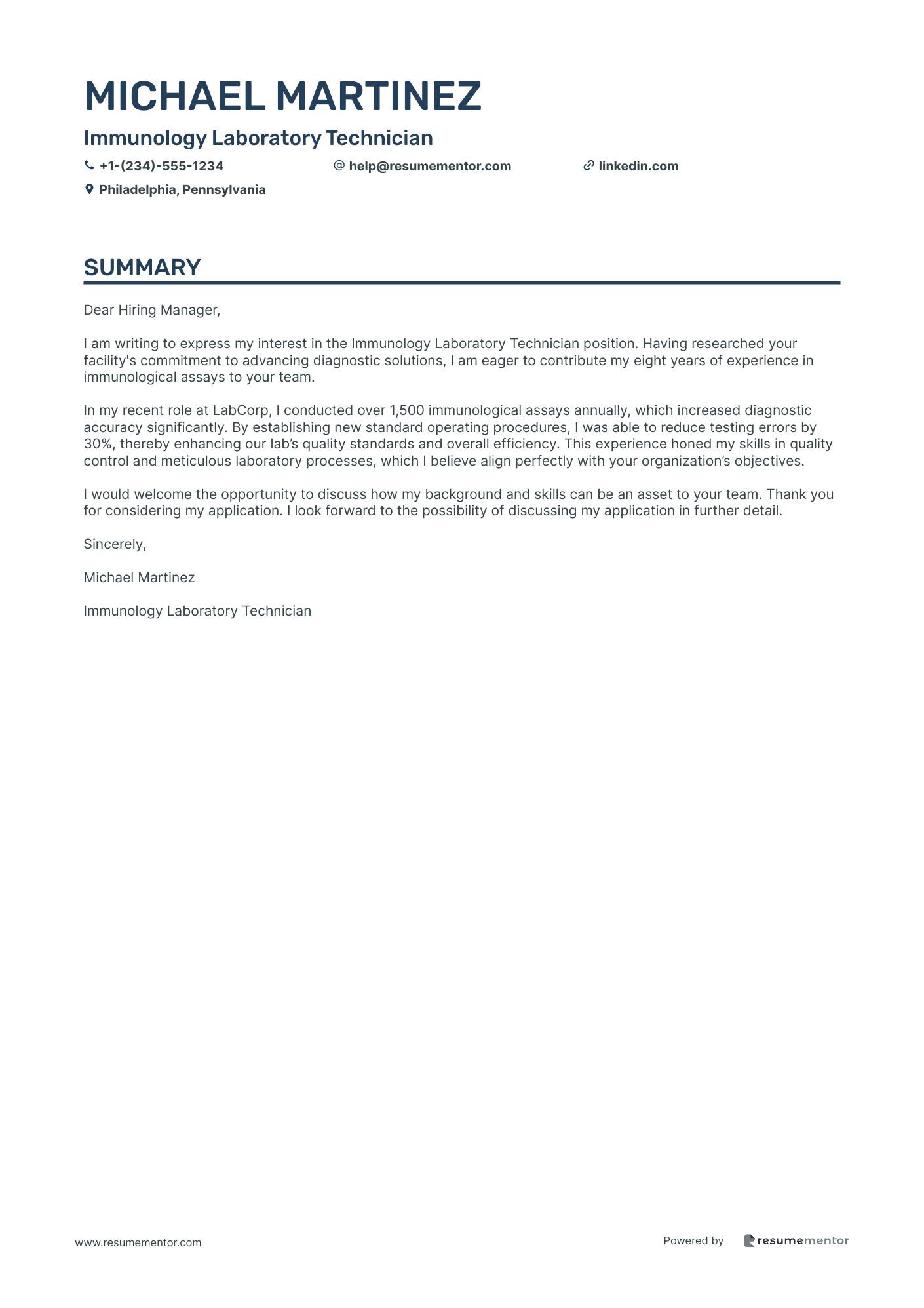
Immunology Laboratory Technician
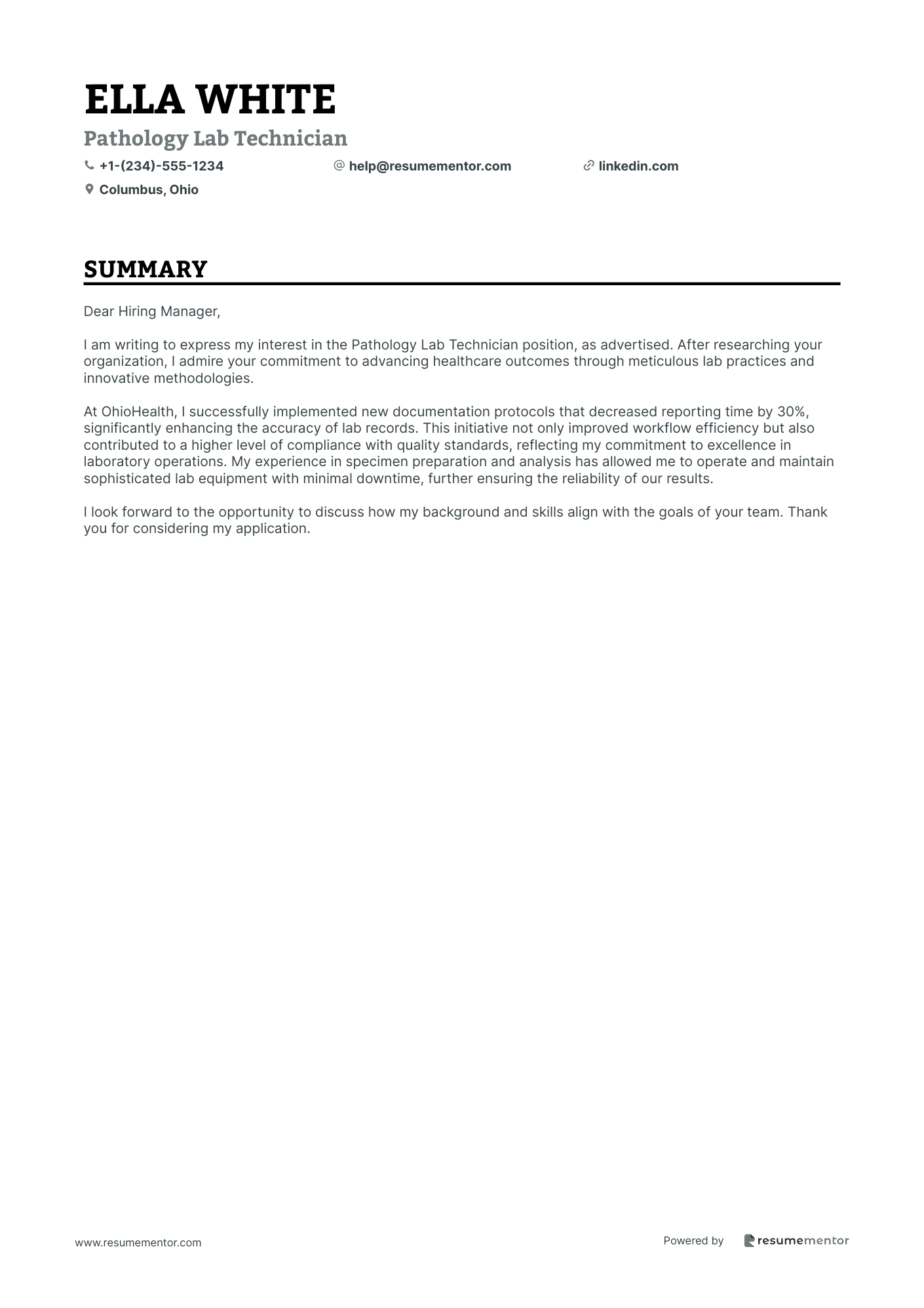
Pathology Lab Technician
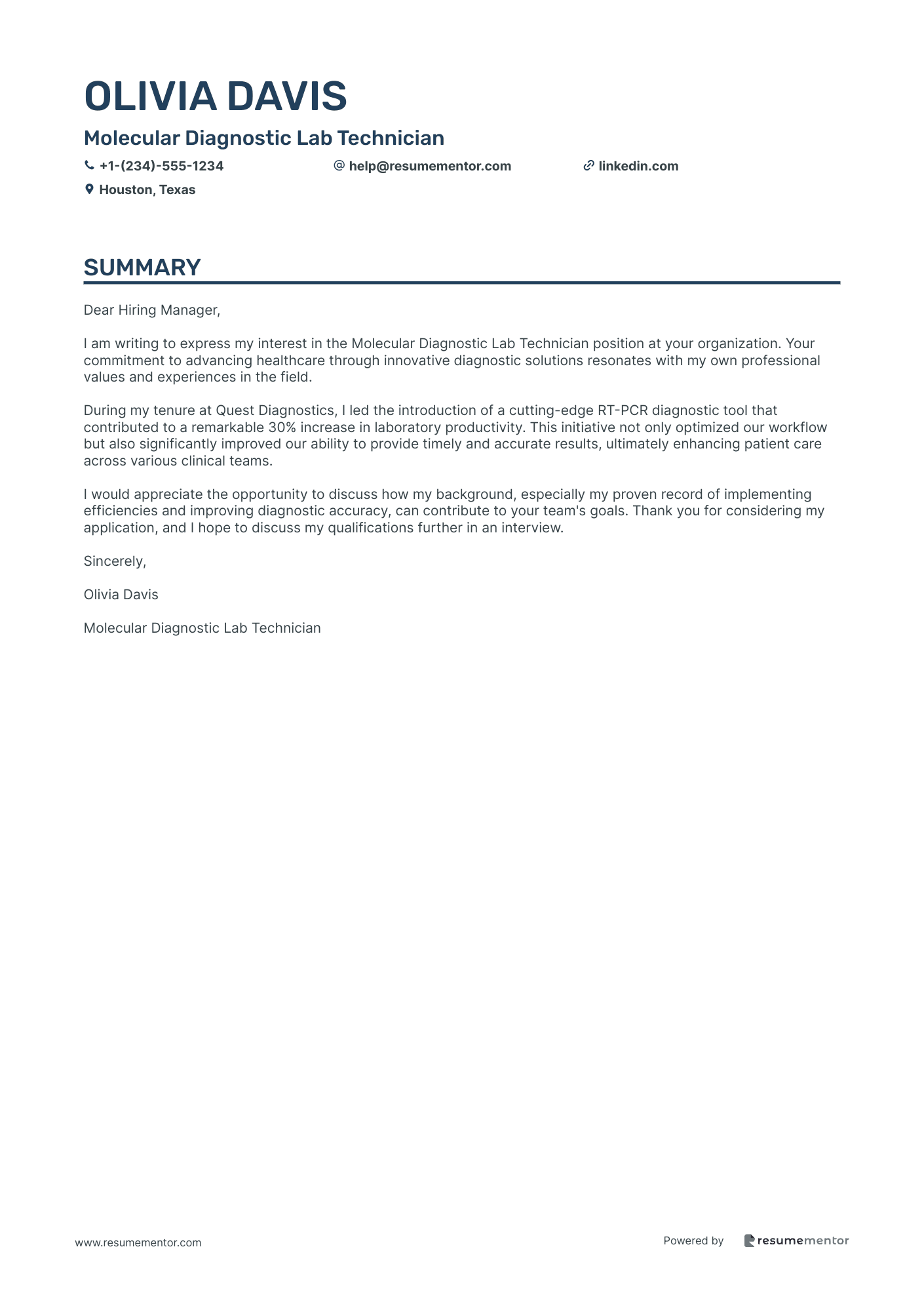
Molecular Diagnostic Lab Technician
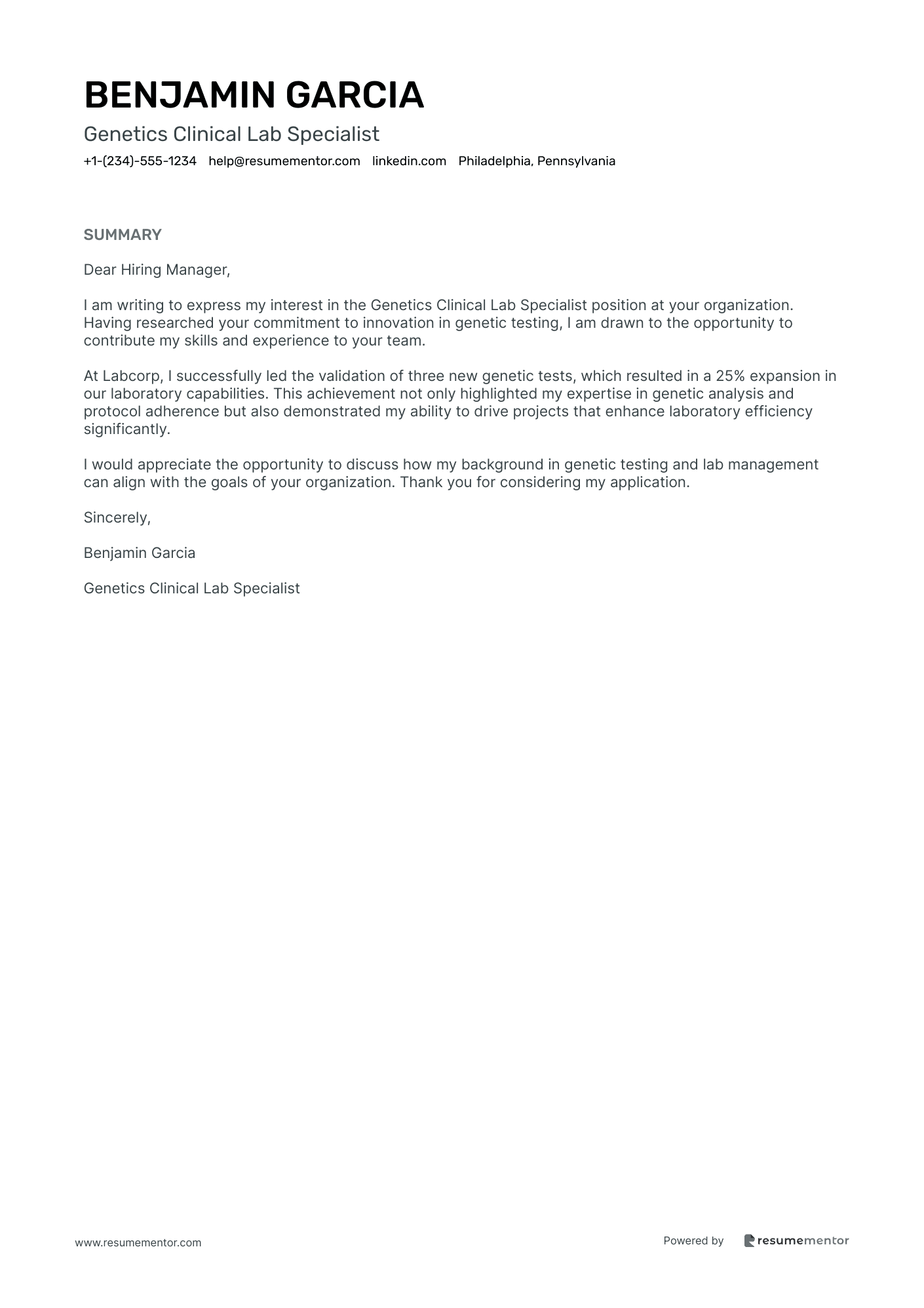
Genetics Clinical Lab Specialist
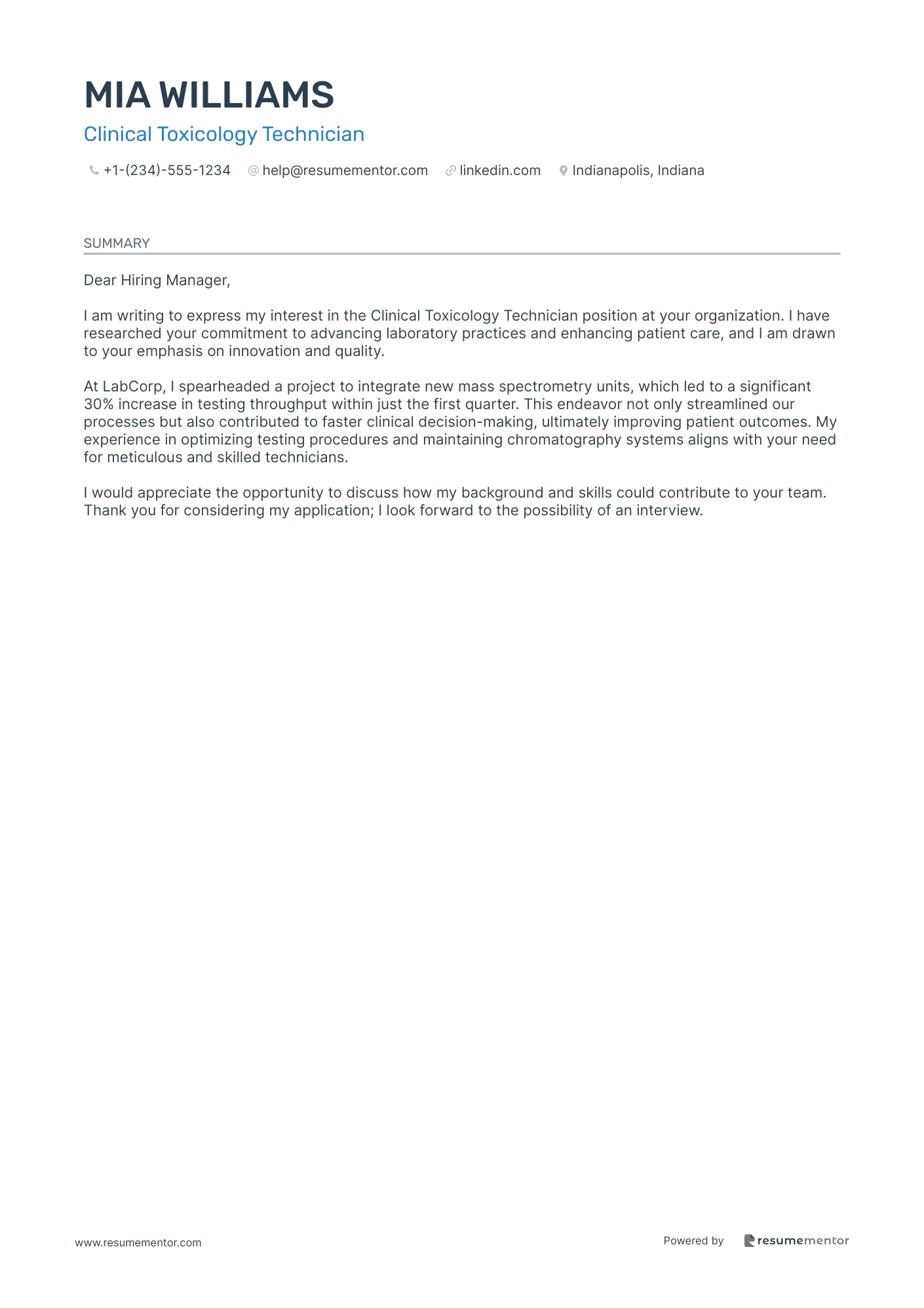
Clinical Toxicology Technician
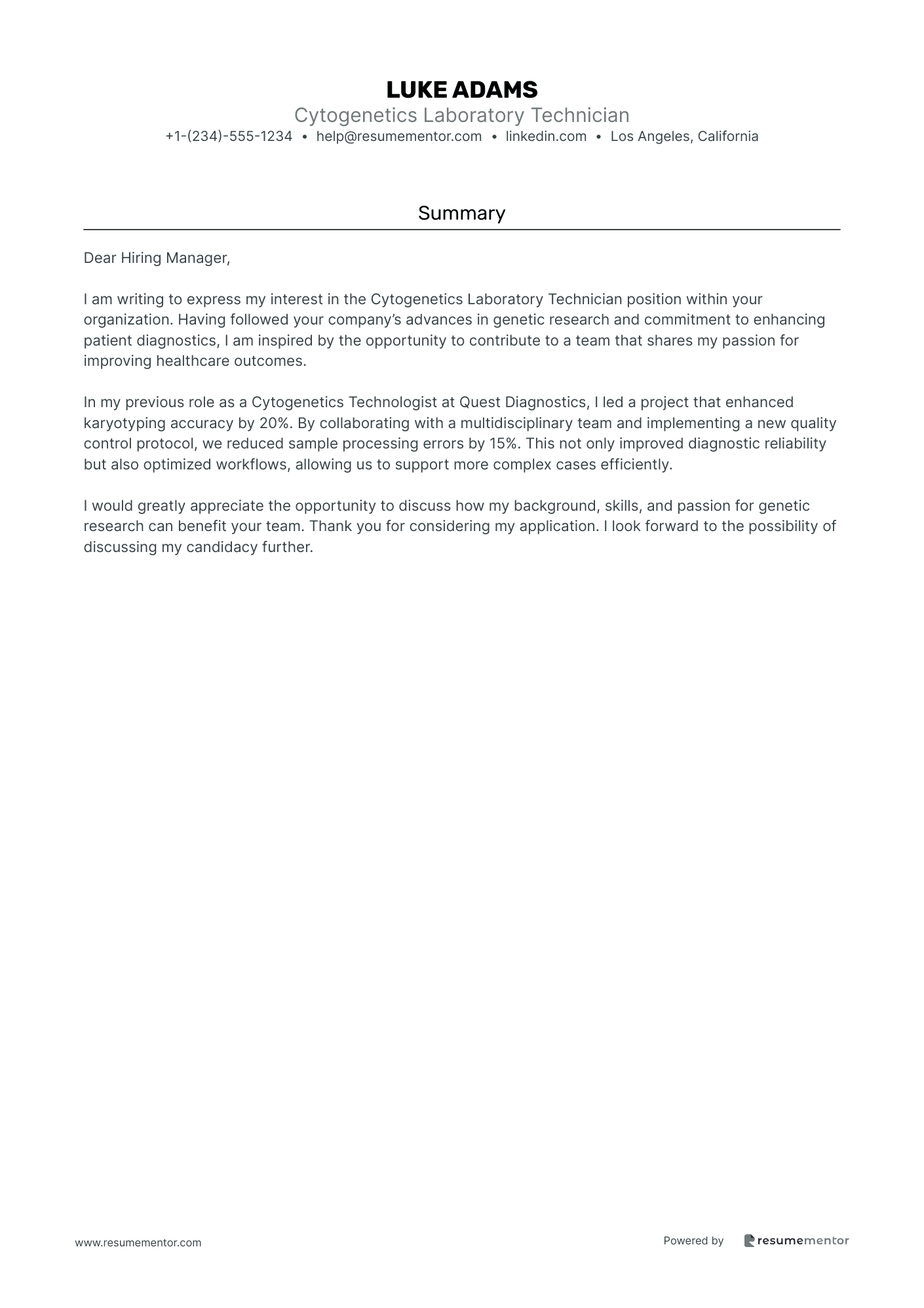
Cytogenetics Laboratory Technician
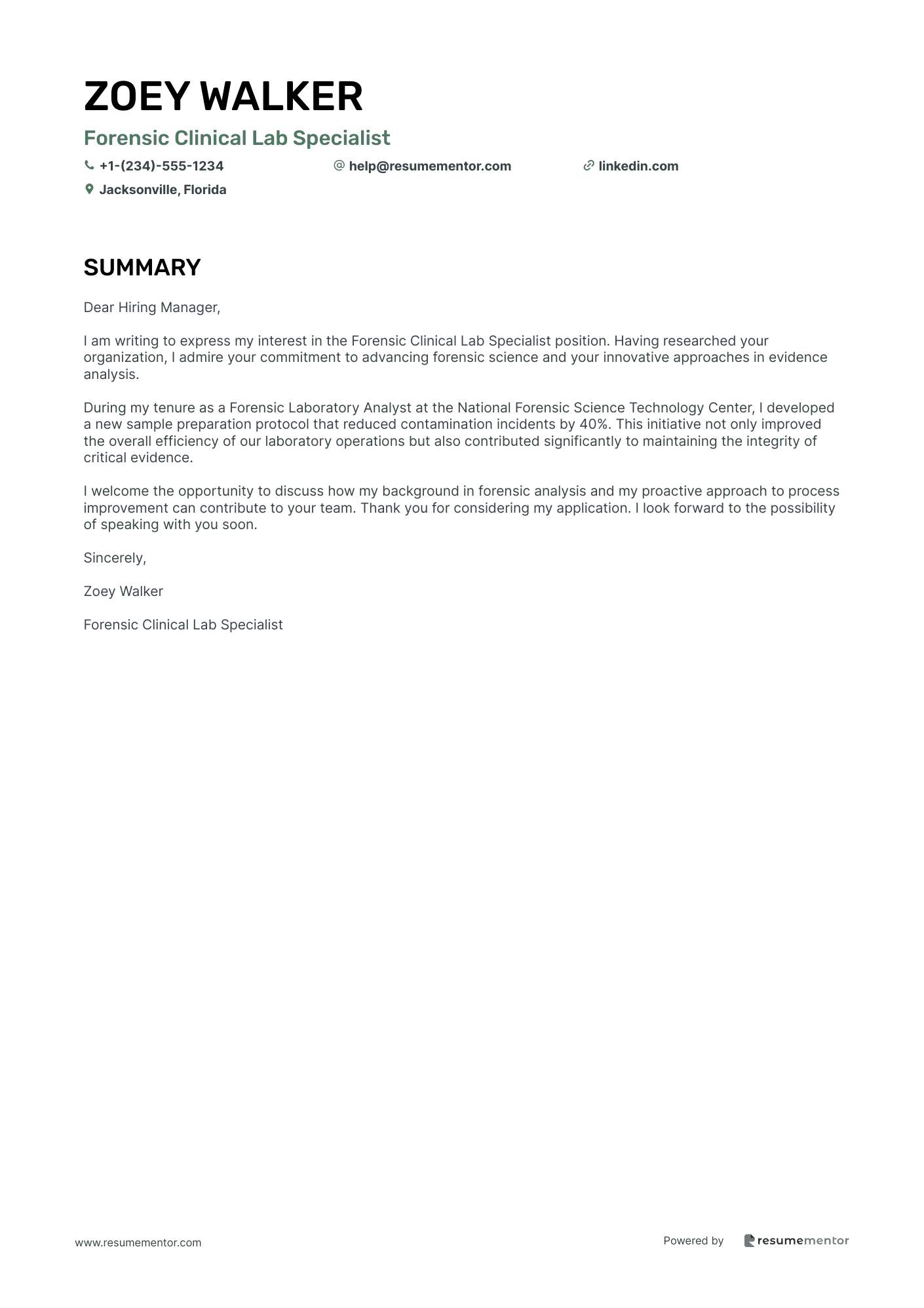
Forensic Clinical Lab Specialist
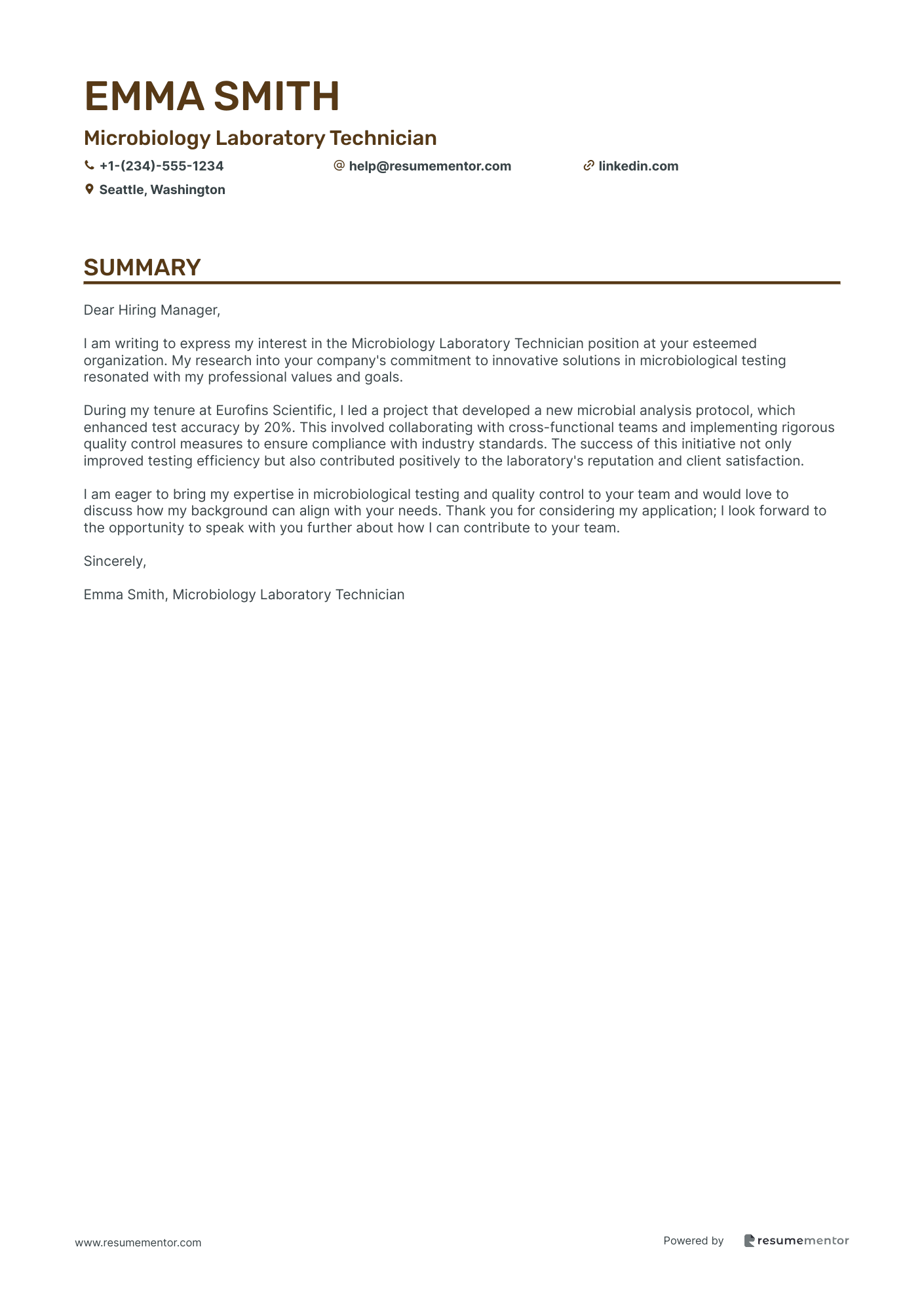
Microbiology Laboratory Technician

Hematology Clinical Lab Specialist cover letter sample
When applying for this position, it’s essential to highlight your experience in laboratory techniques and procedures. Mention any certifications or training in hematology or related fields, emphasizing your hands-on skills. Discuss your ability to analyze and interpret complex data accurately, as well as your attention to detail in sample handling and testing. Providing examples of how you've improved lab efficiency, reduced errors, or contributed to patient care can strengthen your application. Use specific metrics to demonstrate your impact, ensuring a clear narrative of your contributions.
Liam Johnson
Hematology Clinical Lab Specialist
Summary
Dear Hiring Manager,
I am writing to express my interest in the Hematology Clinical Lab Specialist position at your organization. I have followed your commitment to patient care and innovative techniques in laboratory science, which aligns with my professional values and experiences.
During my tenure at Stanford Health Care, I spearheaded a project that improved laboratory processing efficiency by 20%. By implementing new protocols, I ensured quicker patient care delivery while maintaining a 95% accuracy rate in complex hematology tests. This achievement not only enhanced our operational workflow but also positively impacted patient outcomes, reflecting my commitment to quality and efficiency in laboratory practices.
I would welcome the opportunity to discuss how my background, skills, and certifications can contribute to the continued success of your laboratory team. Thank you for considering my application, and I look forward to the possibility of discussing this exciting opportunity with you.
Sincerely,
Liam Johnson
Hematology Clinical Lab Specialist
Clinical Biochemistry Technician cover letter sample
When applying for this position, highlight any laboratory experience or relevant coursework in biochemistry or clinical sciences. Emphasize your proficiency in handling laboratory equipment, performing tests, and analyzing biological samples. If you have certifications such as 'Clinical Laboratory Science' or 'Quality Control Practices', be sure to include these. Use specific examples to demonstrate how your attention to detail and analytical skills have improved test accuracy or increased efficiency in previous roles, showcasing your ability to contribute to the lab's success effectively.
Lucas Rodriguez
Clinical Biochemistry Technician
Summary
Dear Hiring Manager,
I am writing to express my interest in the Clinical Biochemistry Technician position at your esteemed laboratory. After researching your commitment to innovative diagnostic solutions, I am eager to contribute my expertise in clinical biochemistry to support your team.
In my current role as a Biochemistry Laboratory Technician at Scripps Health, I led a significant project that streamlined our lab workflows, enhancing test throughput by 30%. This achievement not only improved team productivity but also underscored my ability to implement effective operational strategies. By pioneering an equipment maintenance protocol, I was able to reduce downtime by 15%, ensuring consistent compliance and reliability in our testing procedures.
I would welcome the opportunity to discuss how my background and skills can benefit your laboratory. Thank you for considering my application; I look forward to the possibility of discussing this exciting opportunity with you.
Immunology Laboratory Technician cover letter sample
When preparing your cover letter, emphasize any laboratory experience, especially with immunological techniques. Highlight your familiarity with specific procedures, such as ELISA or PCR, and include any relevant certifications, such as Good Laboratory Practice (GLP). It’s important to showcase your attention to detail and your ability to follow strict protocols. Provide examples of how your work has contributed to successful research projects or diagnostics. Using specific instances where your skills led to accurate results will greatly enhance your application.
Michael Martinez
Immunology Laboratory Technician
Summary
Dear Hiring Manager,
I am writing to express my interest in the Immunology Laboratory Technician position. Having researched your facility's commitment to advancing diagnostic solutions, I am eager to contribute my eight years of experience in immunological assays to your team.
In my recent role at LabCorp, I conducted over 1,500 immunological assays annually, which increased diagnostic accuracy significantly. By establishing new standard operating procedures, I was able to reduce testing errors by 30%, thereby enhancing our lab’s quality standards and overall efficiency. This experience honed my skills in quality control and meticulous laboratory processes, which I believe align perfectly with your organization’s objectives.
I would welcome the opportunity to discuss how my background and skills can be an asset to your team. Thank you for considering my application. I look forward to the possibility of discussing my application in further detail.
Sincerely,
Michael Martinez
Immunology Laboratory Technician
Pathology Lab Technician cover letter sample
When applying for this position, it’s important to showcase any hands-on experience with lab equipment and techniques. Highlight your familiarity with specimen processing, quality control, and adherence to safety protocols. If you have certifications, such as those in laboratory procedures or medical terminology, include them to demonstrate your commitment. Use specific examples to illustrate your accuracy in test results and your attention to detail. Explain how your contributions have improved lab efficiency or patient outcomes by using a 'challenge-action-result' framework.
Summary
Dear Hiring Manager,
I am writing to express my interest in the Pathology Lab Technician position, as advertised. After researching your organization, I admire your commitment to advancing healthcare outcomes through meticulous lab practices and innovative methodologies.
At OhioHealth, I successfully implemented new documentation protocols that decreased reporting time by 30%, significantly enhancing the accuracy of lab records. This initiative not only improved workflow efficiency but also contributed to a higher level of compliance with quality standards, reflecting my commitment to excellence in laboratory operations. My experience in specimen preparation and analysis has allowed me to operate and maintain sophisticated lab equipment with minimal downtime, further ensuring the reliability of our results.
I look forward to the opportunity to discuss how my background and skills align with the goals of your team. Thank you for considering my application.
Molecular Diagnostic Lab Technician cover letter sample
When applying for this position, it’s essential to highlight any hands-on experience with molecular techniques like PCR or sequencing. Mention any relevant certifications, such as CLIA or CAP accreditation, to demonstrate your knowledge. Detail your proficiency in lab equipment and software, emphasizing how you’ve improved processes or increased accuracy in past roles. Include specific examples of how your work has led to reliable test results or faster turnaround times. Always focus on measurable outcomes to show your impact on laboratory efficiency and patient care.
Olivia Davis
Molecular Diagnostic Lab Technician
Summary
Dear Hiring Manager,
I am writing to express my interest in the Molecular Diagnostic Lab Technician position at your organization. Your commitment to advancing healthcare through innovative diagnostic solutions resonates with my own professional values and experiences in the field.
During my tenure at Quest Diagnostics, I led the introduction of a cutting-edge RT-PCR diagnostic tool that contributed to a remarkable 30% increase in laboratory productivity. This initiative not only optimized our workflow but also significantly improved our ability to provide timely and accurate results, ultimately enhancing patient care across various clinical teams.
I would appreciate the opportunity to discuss how my background, especially my proven record of implementing efficiencies and improving diagnostic accuracy, can contribute to your team's goals. Thank you for considering my application, and I hope to discuss my qualifications further in an interview.
Sincerely,
Olivia Davis
Molecular Diagnostic Lab Technician
Genetics Clinical Lab Specialist cover letter sample
When applying for this position, it’s important to highlight your experience with genetic testing and analysis. Include your familiarity with laboratory instruments and software used for genetic sequencing. Mention any relevant certifications, such as Clinical Genetics Technology or Genetic Counseling, to showcase your expertise. Be sure to provide examples of how your skills have improved accuracy in diagnostics or streamlined lab processes. Use the 'skill-action-result' format to demonstrate your contributions to previous teams and how they led to successful patient outcomes.
Benjamin Garcia
Genetics Clinical Lab Specialist
Summary
Dear Hiring Manager,
I am writing to express my interest in the Genetics Clinical Lab Specialist position at your organization. Having researched your commitment to innovation in genetic testing, I am drawn to the opportunity to contribute my skills and experience to your team.
At Labcorp, I successfully led the validation of three new genetic tests, which resulted in a 25% expansion in our laboratory capabilities. This achievement not only highlighted my expertise in genetic analysis and protocol adherence but also demonstrated my ability to drive projects that enhance laboratory efficiency significantly.
I would appreciate the opportunity to discuss how my background in genetic testing and lab management can align with the goals of your organization. Thank you for considering my application.
Sincerely,
Benjamin Garcia
Genetics Clinical Lab Specialist
Clinical Toxicology Technician cover letter sample
When applying for this position, it’s important to highlight any laboratory experience and familiarity with toxicology. Mention relevant coursework, such as 'Clinical Chemistry' or 'Pharmacology', to showcase your scientific background. Emphasize your attention to detail and ability to follow strict protocols, as these are essential for accuracy in testing. Include examples of how you utilized analytical skills to solve problems or improve procedures in previous roles. This approach demonstrates your capability and readiness to contribute effectively to the team.
Mia Williams
Clinical Toxicology Technician
Summary
Dear Hiring Manager,
I am writing to express my interest in the Clinical Toxicology Technician position at your organization. I have researched your commitment to advancing laboratory practices and enhancing patient care, and I am drawn to your emphasis on innovation and quality.
At LabCorp, I spearheaded a project to integrate new mass spectrometry units, which led to a significant 30% increase in testing throughput within just the first quarter. This endeavor not only streamlined our processes but also contributed to faster clinical decision-making, ultimately improving patient outcomes. My experience in optimizing testing procedures and maintaining chromatography systems aligns with your need for meticulous and skilled technicians.
I would appreciate the opportunity to discuss how my background and skills could contribute to your team. Thank you for considering my application; I look forward to the possibility of an interview.
Cytogenetics Laboratory Technician cover letter sample
When applying for this role, it's essential to highlight any laboratory experience, particularly in cytogenetics or molecular biology. Attention to detail and strong analytical skills are critical; showcase instances where you identified errors or improved processes. Mention any relevant certifications, such as those in clinical laboratory science or genetic testing. Discuss specific techniques you've mastered, like FISH or karyotyping, and how they contributed to accurate results. Use quantifiable outcomes to demonstrate your impact, focusing on how your contributions enhanced team efficiency or patient care.
Luke Adams
Cytogenetics Laboratory Technician
Summary
Dear Hiring Manager,
I am writing to express my interest in the Cytogenetics Laboratory Technician position within your organization. Having followed your company’s advances in genetic research and commitment to enhancing patient diagnostics, I am inspired by the opportunity to contribute to a team that shares my passion for improving healthcare outcomes.
In my previous role as a Cytogenetics Technologist at Quest Diagnostics, I led a project that enhanced karyotyping accuracy by 20%. By collaborating with a multidisciplinary team and implementing a new quality control protocol, we reduced sample processing errors by 15%. This not only improved diagnostic reliability but also optimized workflows, allowing us to support more complex cases efficiently.
I would greatly appreciate the opportunity to discuss how my background, skills, and passion for genetic research can benefit your team. Thank you for considering my application. I look forward to the possibility of discussing my candidacy further.
Forensic Clinical Lab Specialist cover letter sample
When applying for this role, focus on your experience with lab techniques and forensic analysis. Highlight your attention to detail and accuracy in processing samples. Certifications in laboratory safety and quality control are essential, so be sure to include those. Provide examples of how your skills led to successful investigations or improved lab efficiency, using a 'skill-action-result' framework. Mention collaboration with law enforcement or legal teams to showcase your ability to work under pressure and contribute to critical cases.
Zoey Walker
Forensic Clinical Lab Specialist
Summary
Dear Hiring Manager,
I am writing to express my interest in the Forensic Clinical Lab Specialist position. Having researched your organization, I admire your commitment to advancing forensic science and your innovative approaches in evidence analysis.
During my tenure as a Forensic Laboratory Analyst at the National Forensic Science Technology Center, I developed a new sample preparation protocol that reduced contamination incidents by 40%. This initiative not only improved the overall efficiency of our laboratory operations but also contributed significantly to maintaining the integrity of critical evidence.
I welcome the opportunity to discuss how my background in forensic analysis and my proactive approach to process improvement can contribute to your team. Thank you for considering my application. I look forward to the possibility of speaking with you soon.
Sincerely,
Zoey Walker
Forensic Clinical Lab Specialist
Microbiology Laboratory Technician cover letter sample
When crafting your cover letter, focus on your hands-on experience with microbiological techniques, such as culturing, staining, and microscopy. Highlight your familiarity with laboratory safety protocols and quality control procedures. If you have experience with specific equipment, such as PCR machines or autoclaves, be sure to mention this. Include any relevant coursework or certifications, like a degree in microbiology or lab technician training. Provide examples of how your attention to detail and problem-solving skills have led to successful project outcomes in previous roles.
Emma Smith
Microbiology Laboratory Technician
Summary
Dear Hiring Manager,
I am writing to express my interest in the Microbiology Laboratory Technician position at your esteemed organization. My research into your company's commitment to innovative solutions in microbiological testing resonated with my professional values and goals.
During my tenure at Eurofins Scientific, I led a project that developed a new microbial analysis protocol, which enhanced test accuracy by 20%. This involved collaborating with cross-functional teams and implementing rigorous quality control measures to ensure compliance with industry standards. The success of this initiative not only improved testing efficiency but also contributed positively to the laboratory's reputation and client satisfaction.
I am eager to bring my expertise in microbiological testing and quality control to your team and would love to discuss how my background can align with your needs. Thank you for considering my application; I look forward to the opportunity to speak with you further about how I can contribute to your team.
Sincerely,
Emma Smith, Microbiology Laboratory Technician
Related Articles

Continue Reading
Check more recommended readings to get the job of your dreams.
Resume
Resources
Tools
© 2026. All rights reserved.
Made with love by people who care.
